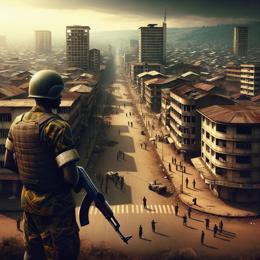Image created by AI
North Korean Troop Deployment Raises Alarms of Wider Conflict in Ukraine
In an alarming revelation, the Pentagon has confirmed that North Korea has substantially increased its military involvement in the Ukraine conflict, dispatching an estimated 10,000 troops to train in Russia, a stark escalation from the initial estimate of 3,000 last week. These developments have heightened anxieties about the potential widening of the war, with troops progressively inching closer to the Ukraine border.
The Pentagon spokesperson, Sabrina Singh, addressing the media on Monday, expressed the United States' growing trepidation regarding Russia's intentions to employ North Korean soldiers in battlefield operations against Ukrainian forces, particularly within Russia's Kursk Oblast, adjacent to Ukraine.
In response to these unnerving developments, South Korea's President Yoon Suk-yeol voiced grave concerns on Tuesday over this apparent military collaboration, emphasizing the threat it poses not only to South Korean national security but also to broader international stability, labeling the cooperation as "illegal."
NATO Secretary-General Mark Rutte underscored the severity of the situation after discussions with the South Korean delegation. He declared the North Korean troop movement as "a significant escalation" and "a dangerous expansion" that imperils security across the Indo-Pacific and Euro-Atlantic regions.
While a North Korean Ministry of Foreign Affairs official refrained from confirming troop deployment, they suggested such actions would conform to international standards if they occurred. In contrast, Russian authorities have vacillated between denials and ambiguous acknowledgments, with Foreign Minister Sergey Lavrov deflecting criticism and pointing to covert Western military support to Ukraine.
Upcoming meetings in Washington, DC between US Defense Secretary Lloyd Austin, Secretary of State Antony Blinken, and their South Korean counterparts are set to address the precarious state of affairs precipitated by North Korean involvement.
As military strategies are scrutinized, Singh emphasized the potential implications of DPRK troops advancing to the front lines, labeling them as co-belligerents in the war, with no limitations on how US-provided weaponry might be employed against them. This bold stance echoes Ukrainian Foreign Minister Andrii Sybiha's urgent calls for more decisive aid and fewer restrictions on Ukraine's military counteractions.
The international community watches intently as the US deliberates its next moves and South Korea evaluates its countermeasures, both keenly aware of the dire potential for an expanded conflict that could spill beyond Ukraine's borders.










